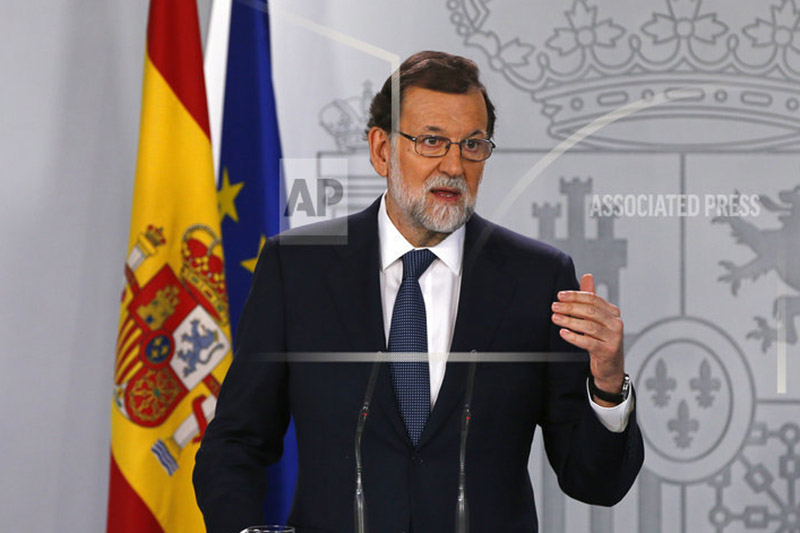Spain's PM seeks clarity from Catalonia on independence
MADRID: Spanish Prime Minister Mariano Rajoy demanded Wednesday that the leader of Catalonia clarify whether he has declared the region's independence, issuing a veiled threat that the central government could limit or rescind Catalan autonomy if he has.
Rajoy said Catalan president Carles Puigdemont's response would be crucial in deciding "events over the coming days."
The prime minister's remarks marked the first time that Rajoy has openly said that invoking a section of the Spanish Constitution that allows the government to assert control over regions would be the next step, if Catalan authorities don't backtrack.
The central government "wants to offer certainty to citizens" and it was "necessary to return tranquility and calm," he said following a special Cabinet meeting.
Rajoy's demand was in response to Puigdemont's announcement that he was proceeding with a declaration of independence following the disputed secession referendum Catalonia held on Oct. 1 referendum, but suspending the move from taking effect for several weeks to facilitate negotiations.
Speaking in parliament later Wednesday, the prime minister said the referendum was part of a strategy "to impose independence that few want and is good for nobody."
The ensuing crisis, he said, was "one of the most difficult times in our recent history."
Rajoy said Catalan authorities broke the law by holding the referendum and incited street protests to give an appearance of legitimacy to the vote.
He did not refer to the violence with which police cracked down on voting day but said "nobody can be proud of the image" Spain projected, adding that the only ones to blame were the separatist leaders.
Catalan lawyers, civil society groups and politicians in Catalonia and elsewhere in Spain have offered to mediate between the two sides, but the prime minister rejected the offers while thanking those who made them.
"There is no possible mediation between democratic law and disobedience and unlawfulness," Rajoy said.
In a highly anticipated speech Tuesday night, Puigdemont said the landslide victory in the disputed Oct. 1 referendum gave his government in the regional capital, Barcelona, the grounds to implement its long-held desire to break century-old ties with Spain.
But he proposed the regional parliament suspend the declaration's effects to leave room for dialogue and to help reduce tensions surrounding Spain's worst political crisis in decades.
The central government in Madrid has given little indication it is willing to talk, saying it didn't accept the declaration and didn't consider the referendum or its results to be valid.
Article 155 of the Spanish Constitution allows the central government to take some or total control of any of its 17 regions if they don't comply with their legal obligations. This would begin with a Cabinet meeting and a warning to the regional government to fall into line. Then, the Senate could be called to approve the measure.
About 2.3 million Catalans — or 43 percent of the electorate in the northeastern region — voted in the referendum. Regional authorities say 90 percent were in favor and declared the results valid. Those who opposed the referendum had said they would boycott the vote.
Rajoy's government had repeatedly refused to grant Catalonia permission to hold a referendum on the grounds that it was unconstitutional, since it would only poll a portion of Spain's 46 million residents.
Catalonia's separatist camp has grown in recent years, strengthened by Spain's recent economic crisis and by Madrid's rejection of attempts to increase self-rule in the region.
The political deadlock has plunged Spain into its deepest political crisis in more than four decades, since democratic rule was restored following the dictatorship of Gen. Francisco Franco.
Opposition Socialist leader Pedro Sanchez on Wednesday offered a compromise of sorts. He said his party and Rajoy's People's Party had agreed to renegotiate the laws that provide certain areas of autonomy to Spain's 17 regions, including Catalonia.
Sanchez said that while his party was backing Rajoy's call for clarification from Puigdemont, the Socialists support changing the current regional arrangements to "allow for Catalonia to remain a part of Spain."
He said he reached a deal with Rajoy to open talks in six months on amending the constitution to address the issue of regional autonomy.
On the streets of Barcelona, residents were following the developments closely.
"They both keep on repeating the same things," resident Alicia Gallego said, referring to Rajoy and Puigdemont.
"The best would be if they could sit down and make some clarity and decide something, maybe a bit more autonomy. I don't know. I am not a politician," she said. "But it is clear that this must have a more reasonable solution."
Another Barcelona resident, Jose Alfaro, said he does not expect any decisive developments to happen any time soon.
"There is enough time to reopen dialogue. Now we are starting a new chapter," he said. "We have to wait and see. I don't think that in the short term something will happen."






